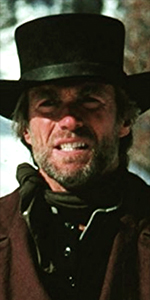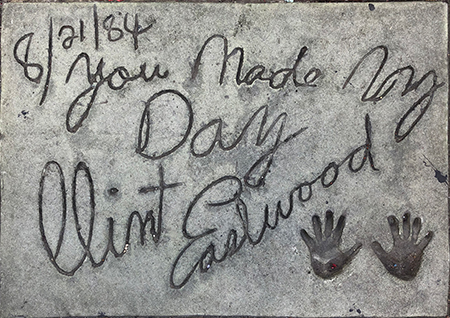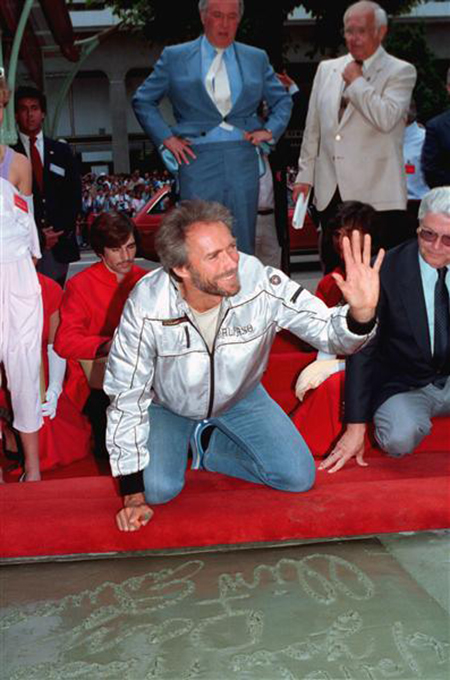 |
 |
 |
 |
 |
| Clint Eastwood as Peacher in Pale Rider, released in June, 1985 |
| |
|
 |
| |
 |
|
|
| Clint Eastwood |
 |
| Forecourt Ceremony held on Tuesday, August 21, 1984 |
| |
Born: May 31, 1930, in San Francisco, California
Age at the time of the ceremony: 54
|
| |
Clint Eastwood is a Hollywood legend. Starring in films since the mid 1960s, his tough, quiet approach to life's problems made him an international icon. His films have been so successful, that he became another (after director Stanley Kubrick) darling at Warner Bros.; the studio now allows him to make anything he wants to make.
Of English, Irish, Scotch and Ducth ancestry, Eastwood can trace his family back to a passenger on the Mayflower. His father worked as a laborer, causing the family to move often. During Clint's high school years however, the family settled in Piedmont California, and lived the good life for awhile.
An apathetic student, Eastwood dropped out of high school and, like his father before him, worked odd jobs until he was drafted into the US Army, where he spent the Korean War doing odd tasks at Ford Ord. While there, a film company was making a film on base, and an assistant director got Eastwood to make a test in Hollywood for director Arthur Lubin. He was given an acting contract — and acting lessons.
His first part for Universal was in Revenge of the Creature (released in March 1955).
Dropped from his acting contract in October 1955, Eastwood went searching for an agent. This process got him several guest slots on television shows like
Highway Patrol, aired in syndication in April 1956, where he played a motorcycle gang leader, and a crazy gold prospector on Death Valley Days, aired in syndication in December 1956.
With his new agent, Eastwood got thrid billing in the western Ambush at Cimarron Pass (released in March 1958), but Eastwood disliked the picture. His big break came from being cast as cowboy Rowdy Yates on Rawhide for 216 episodes, aired over CBS from January 1959 to December 1965. The producers didn't pay Eastwood very well, so even though the show was popular, he took the lead in a western an Italian director named Sergio Leone was making. Instead of playing an innocent cowpuncher, Eastwood created a more complex character — the Man with No Name.
Per un pugno di dollari - A Fistfull of Dollars (released in December 1965 in Italy; in May 1967 in the US), made Eastwood a star in Italy; Per qualche dollaro pui - For a Few Dollars More (released in September 1964 in Italy; in January 1967 in the US), was rushed into production. The third installment, Il buono, il brutto, il cattivo - The Good, the Bad and the Ugly (released in Italy in December 1966; in December 1967 in the US), became a huge hit internationally.
With the money from these "spaghetti" westerns, Eastwood established his Malpaso Productions which made
Hang 'Em High (released in August 1968); Eastwood got a share of the gross — the picture was a large hit. Eastwood could now take chances on his pictures; he co-starred with Lee Marvin in the musical Paint Your Wagon (released in October 1969), with Lee Marvin. Eastwood's signing failed to impress anyone.
Working within his own production company from now on, Eastwood and director Don Siegel made
The Beguiled (released in March 1971), with Geraldine Page, which unfortunately flopped. Undaunted, Eastwood directed his first film Play Misty for Me (released in November 1971), then, working with Don Siegel again, made his second signature role — that of police detective Harry Callahan in Dirty Harry (released in December 1971); it became a career-difining monster hit.
Returning to the western form,
director John Sturges guided Eastwood through Joe Kidd (released in July 1972), with Robert Duvall, but Eastwood took the director's chair for High Plains Drifter (released in August 1973). Eastwood took a low-budget chance on the love story Breezy (released in November 1973), with William Holden, but the picture didn't do well.
Returning to his "Make one for them, then, make one for yourself," Eastwood returned as Harry Callhan in
Magnum Force (which played the Chinese in December 1973). This did well enough for him to star in and direct The Outlaw Josey Wales (released in June 1976), which has since become a respected western. More hits followed, including Every Which Way But Loose (released in December 1978), and Escape from Alcatraz (released in June 1979). The winsome Bronco Billy (released in June 1980), more-or-less flopped, but Eastwood's return again as Dirty Harry in Sudden Impact (released in December 1983), was a predictable hit.
Eastwood was finally asked to make his imprint at the theatre when
Tightrope (which played the Chinese in August 1984), was showing at the theatre. Eastwood was one of the biggest stars in the world now, and he continued to explore western themes in films like Pale Rider (released in June 1985); the military in Heartbreak Ridge (released in December 1986), with Marsha Mason, and he directed Forest Whitaker in a biopic of jazz musician Charlie Parker in Bird (released in September 1988). He made a film about big-game hunting in Africa, White Hunter, Black Heart (released in September 1990), which no one went to see.
All that was forgotten in the wake of Eastwood's remarkable western
Unforgiven (which played the Chinese in August 1992), with Gene Hackman. The powerful film brought Oscars for Best Picture and a Best Director to Eastwood. He followed this up with a stellar turn as a secret service agent in director Wolfgang Petersen's In the Line of Fire (released in July 1993), with John Malkovitch, and finally played to the female audience in The Bridges of Madison County (released in June 1995), with Meryl Streep.
Eastwood continued to direct almost all of the films he starred in, as well as other pictures, like Midnight in the Garden of Good and Evil (released in November 1997), with John Cusack. He starred in and directed Space Cowboys (released in August 2000), with Tommy Lee Jones, then helmed the intense crime film Mystic River (released in October 2003), with Sean Penn, who won an Oscar for his performance.
Speaking of Oscars, Million Dollar Baby (released in December 2004), brought in Eastwood's second Best Picture and directing Oscars with Hillary Swank winning a Best Actress Oscar — be warned — it's a fifteen-hankie movie. His two films on the Battle of Iwo Jima were told from the perspective of the Americans in Flags of Our Fathers (released in October 2006), with Ryan Phillippe, and then from the perspective of the Japanese in Letters from Iwo Jima (released in February 2007), with Ken Watanabe. All tough, hard-hitting films.
So too is Gran Torino (released in December 2008), where Eastwood plays with the changing nature of the American population, while Invictus (released in December 2009), with Morgan Freeman, deals with the challenge of pulling together the racially divided nation of South Africa.
American Sniper (which played the Chinese in January 2015), with Bradley Cooper, was controversial due to Eastwood's dualistic treatment of its story; there would be no such ambiguity in Sully (which played the Chinese in September 2016), with Tom Hanks playing the brave airline pilot Chesley Sullenberger. Eastwood's latest essay on heroism has been drubbed by both critics and the public: The 15:17 to Paris (released in February 2018).
But Clint just keeps rolling them out: He starred and directed The Mule (released in December 2018) with Patrick L. Reyes, and directed Richard Jewell (which had its World premiered at the Chinese in November 2019) with Paul Walter Hauser. Eastwood produced, directed and starred in Cry Macho (released in September 2021).
At 93-94 years-old, Eastwood directed Juror #2 with Nicholas Hoult, which had its World Premiere at the Chinese on Sunday, October 27, 2024. |
|
|
|
|
| |
 |
 |
| Mann's Chinese Theatre, Hollywood, California. Clint Eastwood Forecourt block. Executed by John Tartaglia, Tuesday, August 21, 1984. 58 x 41 inches. |
 |
 |
 |
| Mann's Chinese Theatre, Hollywood, California. Clint Eastwood Forecourt ceremony, Tuesday, August 21 , 1984. Clint Eastwood gives the fans a wave with Mann Theatres PR vice president William F. Hertz to the right. In the back are Mann Theatres president Ted Mann and Hollywood honorary mayer Johnny Grant. |
|
|